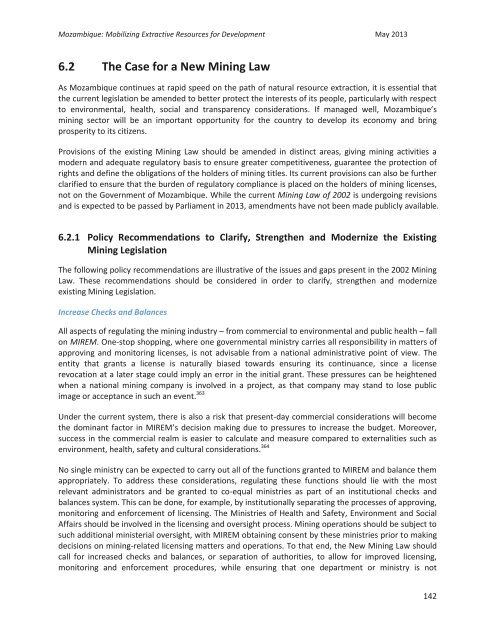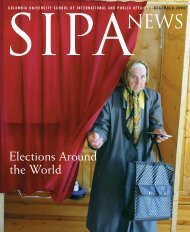Mozambique - School of International and Public Affairs - Columbia ...
Mozambique - School of International and Public Affairs - Columbia ...
Mozambique - School of International and Public Affairs - Columbia ...
You also want an ePaper? Increase the reach of your titles
YUMPU automatically turns print PDFs into web optimized ePapers that Google loves.
<strong>Mozambique</strong>: Mobilizing Extractive Resources for Development May 2013<br />
6.2 The Case for a New Mining Law<br />
As <strong>Mozambique</strong> continues at rapid speed on the path <strong>of</strong> natural resource extraction, it is essential that<br />
the current legislation be amended to better protect the interests <strong>of</strong> its people, particularly with respect<br />
to environmental, health, social <strong>and</strong> transparency considerations. If managed well, <strong>Mozambique</strong>’s<br />
mining sector will be an important opportunity for the country to develop its economy <strong>and</strong> bring<br />
prosperity to its citizens.<br />
Provisions <strong>of</strong> the existing Mining Law should be amended in distinct areas, giving mining activities a<br />
modern <strong>and</strong> adequate regulatory basis to ensure greater competitiveness, guarantee the protection <strong>of</strong><br />
rights <strong>and</strong> define the obligations <strong>of</strong> the holders <strong>of</strong> mining titles. Its current provisions can also be further<br />
clarified to ensure that the burden <strong>of</strong> regulatory compliance is placed on the holders <strong>of</strong> mining licenses,<br />
not on the Government <strong>of</strong> <strong>Mozambique</strong>. While the current Mining Law <strong>of</strong> 2002 is undergoing revisions<br />
<strong>and</strong> is expected to be passed by Parliament in 2013, amendments have not been made publicly available.<br />
6.2.1 Policy Recommendations to Clarify, Strengthen <strong>and</strong> Modernize the Existing<br />
Mining Legislation<br />
The following policy recommendations are illustrative <strong>of</strong> the issues <strong>and</strong> gaps present in the 2002 Mining<br />
Law. These recommendations should be considered in order to clarify, strengthen <strong>and</strong> modernize<br />
existing Mining Legislation.<br />
Increase Checks <strong>and</strong> Balances<br />
All aspects <strong>of</strong> regulating the mining industry – from commercial to environmental <strong>and</strong> public health – fall<br />
on MIREM. One-stop shopping, where one governmental ministry carries all responsibility in matters <strong>of</strong><br />
approving <strong>and</strong> monitoring licenses, is not advisable from a national administrative point <strong>of</strong> view. The<br />
entity that grants a license is naturally biased towards ensuring its continuance, since a license<br />
revocation at a later stage could imply an error in the initial grant. These pressures can be heightened<br />
when a national mining company is involved in a project, as that company may st<strong>and</strong> to lose public<br />
image or acceptance in such an event. 363<br />
Under the current system, there is also a risk that present-day commercial considerations will become<br />
the dominant factor in MIREM’s decision making due to pressures to increase the budget. Moreover,<br />
success in the commercial realm is easier to calculate <strong>and</strong> measure compared to externalities such as<br />
environment, health, safety <strong>and</strong> cultural considerations. 364<br />
No single ministry can be expected to carry out all <strong>of</strong> the functions granted to MIREM <strong>and</strong> balance them<br />
appropriately. To address these considerations, regulating these functions should lie with the most<br />
relevant administrators <strong>and</strong> be granted to co-equal ministries as part <strong>of</strong> an institutional checks <strong>and</strong><br />
balances system. This can be done, for example, by institutionally separating the processes <strong>of</strong> approving,<br />
monitoring <strong>and</strong> enforcement <strong>of</strong> licensing. The Ministries <strong>of</strong> Health <strong>and</strong> Safety, Environment <strong>and</strong> Social<br />
<strong>Affairs</strong> should be involved in the licensing <strong>and</strong> oversight process. Mining operations should be subject to<br />
such additional ministerial oversight, with MIREM obtaining consent by these ministries prior to making<br />
decisions on mining-related licensing matters <strong>and</strong> operations. To that end, the New Mining Law should<br />
call for increased checks <strong>and</strong> balances, or separation <strong>of</strong> authorities, to allow for improved licensing,<br />
monitoring <strong>and</strong> enforcement procedures, while ensuring that one department or ministry is not<br />
142

















